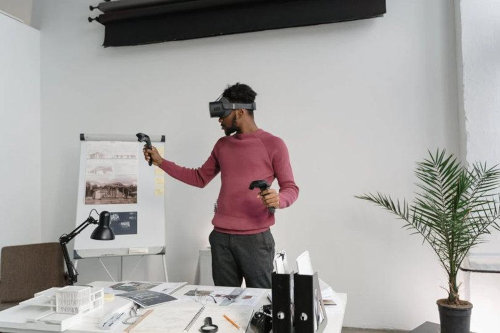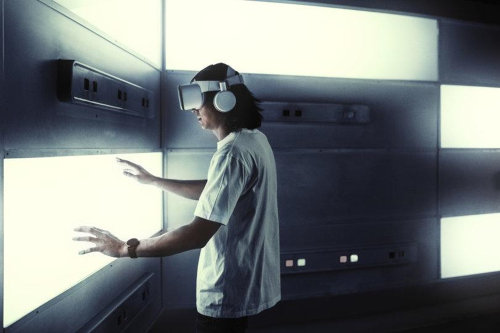As the world starts to explore and transition to Web3, the metaverse is one of the most used cases. Virtual and Augmented Realities (VR and AR) have become more than just fancy tools for entertainment.

photo credit: Tima Miroshnichenko / Pexels
As technology catches up to the hype, the metaverse offers a new working style. Did you know that 77% of employers expressed an interest in immersive work? Indeed, the remote working and work-from-home culture that arose during the pandemic of COVID-19 fundamentally changed how companies now work. Yet, the real revolution is with the use of metaverse for workspaces.
The Benefits of Metaverse Offices
Sure, remote working tools such as Microsoft Teams and even Zoom comes in handy when interacting with a team that is spread beyond the confines of the office and even national borders, but they still lack human connection. Staring at screens just does not cut it.
With the arrival of the metaverse, this is all about to change. Employees will still be working remotely, but the VR and AR technologies will give a sense of being in the same room. Imagine yourself for a moment, working on your computer but viewing through a VR headset. You might be sitting in a virtual office where you can look up to your colleagues and discuss the work-related matter as if all of you were in the same room.
Boardroom meetings, knocking off ideas, discussing work, etc., all the work you can do within an office and remotely becomes a virtual existence.
Metaverse Offices: Friend or Foe?
The appeal only gets larger with all the benefits that metaverse-based offices bring. However, many employees are raising genuine concerns. For them, the technological advantages will come at a significant cost of privacy, no matter how good they are.
VR headsets allow for an immersive interaction because of the enormous amount of data the devices generate by tracking different biometric analyses of the user. According to one report, a typical VR headset tracks about 20 million data points in 20 minutes. This includes body movement, facial expressions, eye tracking, and others. While this tracking is essential to give a good virtual experience, the data collection is what many employees are wary of.
The seemingly benign data offers employers unprecedented access to information on their employees they never had. The data you and your colleagues generate can be collected and analyzed to create AIs and machine learning programs to better understand you.
The information becomes a treasure trove of data for employers to use and track different statistics – very personal ones. Emotional state, stimuli, work attention, and even going as far as to track data points that can tell them if what you are saying is true or not (a lie detector). The employers will know who you enjoy working with, what your weaknesses are and go even beyond that to give your targeted stimuli visual, audio, and work tasks) that can manipulate you into doing things they want you to do without your knowledge.
All of this data, without user consent, presents a significant privacy invasion issue. The worst part is that this data can not only be used by employers unethically to know more about you, but it also becomes a gold mine as they can sell it to other companies like Meta and Alphabet (Facebook and Google). These mega-corporations can eventually use the data to create personalized ads, determine your engagement and use it to manipulate you during your online activities.

How Can This Be Controlled
The short story: regulations and laws.
Technology is developing so fast that traditional laws and regulations are increasingly becoming obsolete. What efforts are being made lack in quality as the basic understanding of “how” the different technologies work to collect the data.
Take the example of the biometric laws in the US. Biometric Identifiers Law states that all employers should ask for consent from their employees to collect and use their biometric data. The laws are vague on what declarations must be made on the data analysis. The law has no provision for selling, leasing, or disclosing the data.
Metaverse offices can clearly circumvent this by hiring third parties to do all the data analysis for them.
The use of metaverse will fundamentally redefine how user data is logged, stored, and shared. For employers, this can be a definitive point on how they will operate in the virtual world. For employees, unless they work in places where their data privacy is a priority, they will have no option to either live with it or move towards better pastures.
While this may seem like a gloomy future, this might change if governments and related departments catch up. Until then, we can only wait and see.